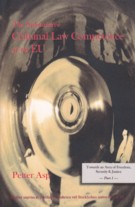| |
Pris: 350 SEK exkl. moms  |  The Lisbon Treaty has brought new challenges to the criminal law cooperation within the EU. As regards the criminal law cooperation, the treaty meant that criminal law issues were transferred from the third pillar to the first, or rather to the one and only remaining pillar and that competence was transferred from the Member States to the EU. This transfer of competence has brought about several new questions as regards the substantive criminal law competence of the EU. This book aims at analysing these issues and thereby providing a more comprehensive account of the substantive criminal law competence of the EU. This book contains: The Lisbon Treaty has brought new challenges to the criminal law cooperation within the EU. As regards the criminal law cooperation, the treaty meant that criminal law issues were transferred from the third pillar to the first, or rather to the one and only remaining pillar and that competence was transferred from the Member States to the EU. This transfer of competence has brought about several new questions as regards the substantive criminal law competence of the EU. This book aims at analysing these issues and thereby providing a more comprehensive account of the substantive criminal law competence of the EU. This book contains:
• A detailed examination of the competence conferred upon the EU under Article 83(1) and (2) TFEU
• An analysis of the question whether there is criminal law competence elsewhere in the treaties
• An analysis of the most important principles guiding the exercise of the competence conferred upon the EU
The book is the first report in the project ”Towards an Area of Freedom, Security and Justice”. As indicated by its title, it focuses on the question of substantive criminal law competence. This book will be followed by a sequel— in 2015—dealing with the criminal law cooperation within the EU as well as with the emerging system of EU criminal law.
Petter Asp is Professor of Criminal Law at Stockholm University and the present holder of the Torsten and Ragnar Söderberg Chair in Legal Science. He is a member of the European Criminal Policy Initiative (2008–) as well as of the Commission’s expert group on EU criminal policy (2011–). He has written extensively on EU Criminal Law and his books include EG:s sanktionsrätt (1998), EU och den svenska straffrätten (2002) and Internationell straffrätt (2011). | | |
|